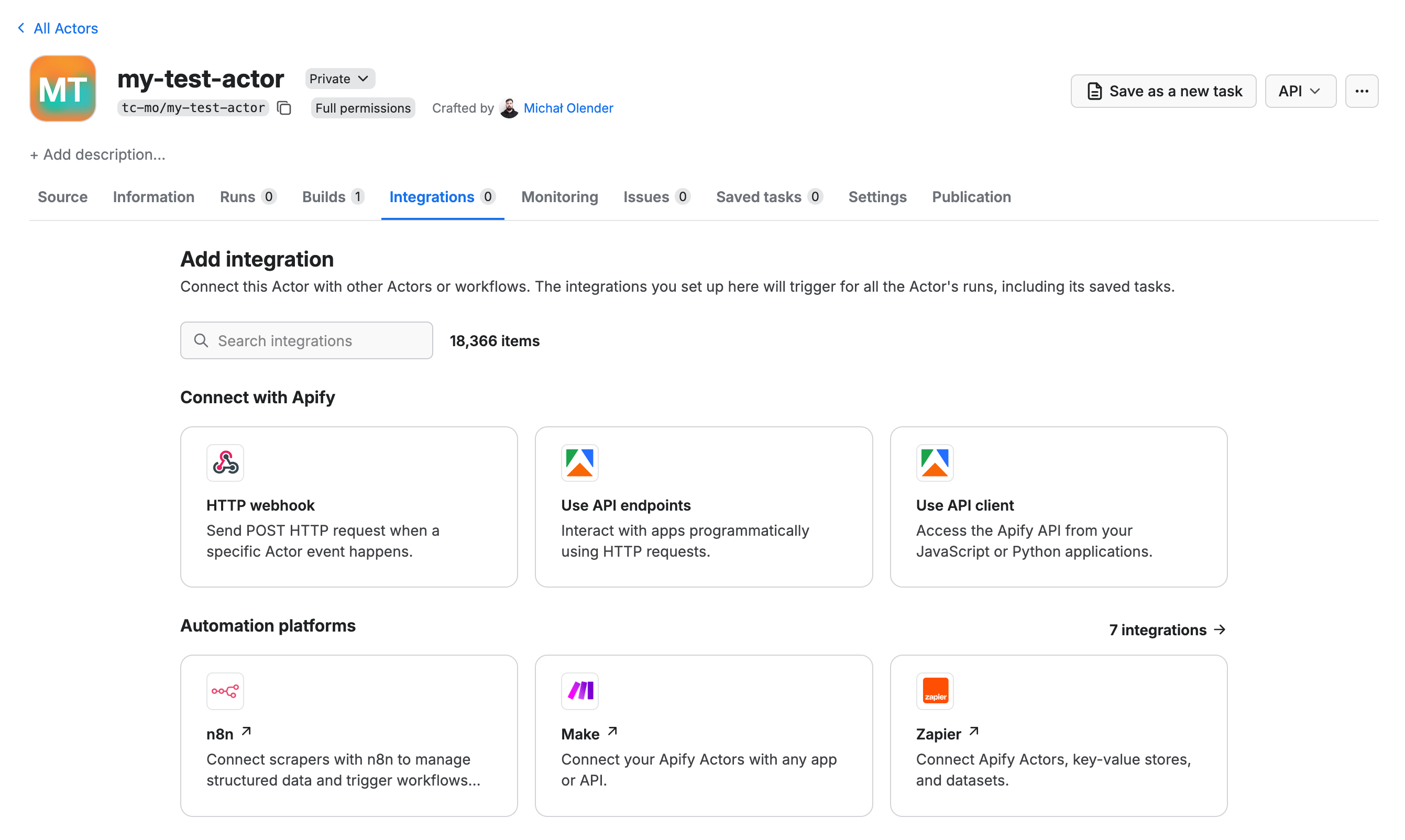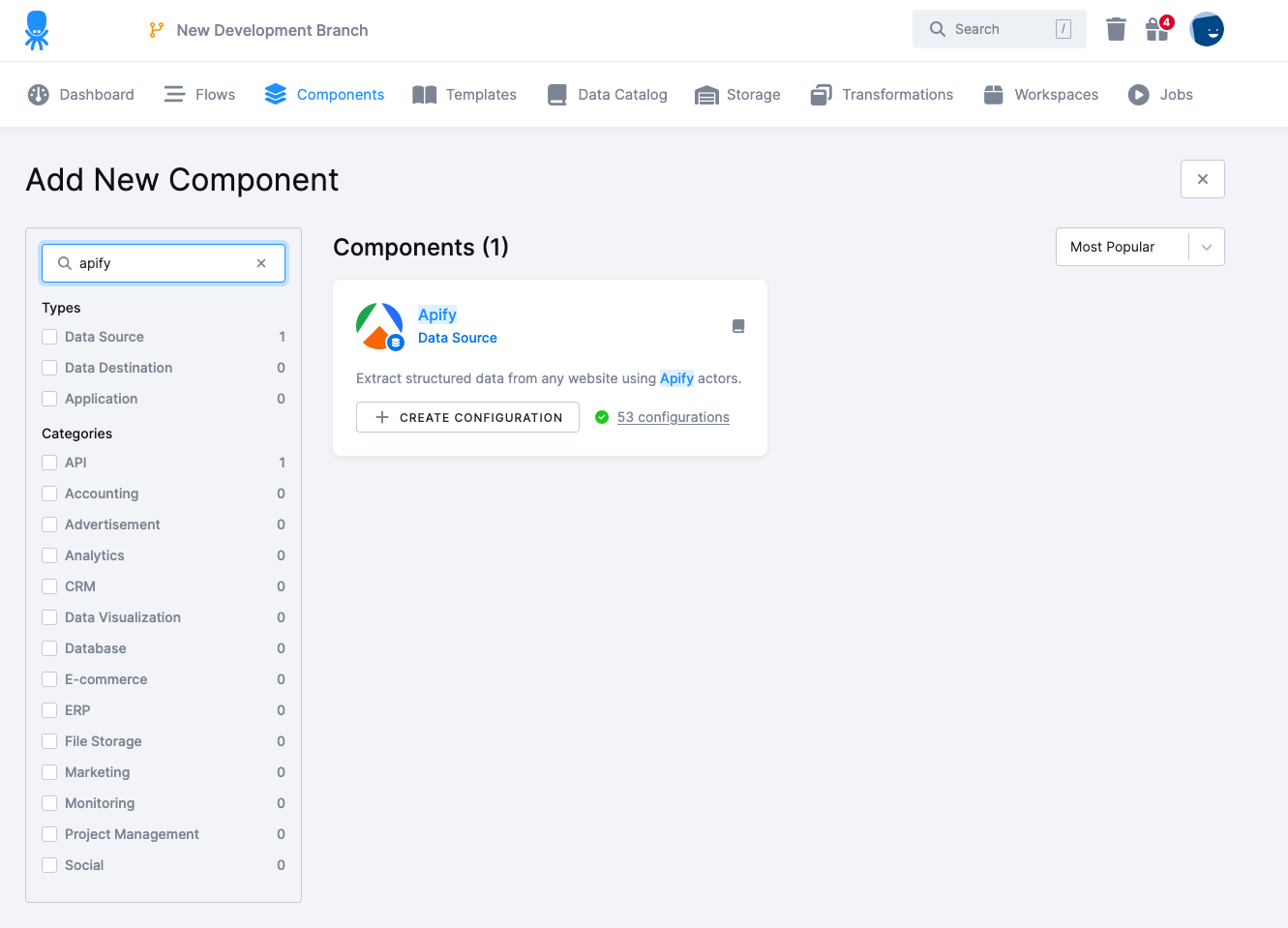Integrate with Apify
If you are building a service and your users could benefit from integrating with Apify or vice versa, we would love to hear from you! Contact us at integrations@apify.com to discuss potential collaboration. We are always looking for ways to make our platform more useful and powerful for our users.
Why integrate with Apify
Apify is the leading platform for web scraping, AI agents, and automation tools. By integrating Apify into your platform, you enable users to incorporate real-time, structured data from the web with zero scraping infrastructure on your side.
Apify Store contains thousands of pre-built Actors, ready-made tools for web scraping and automation.
Integration types
An Apify integration can be general, allowing users to integrate any Actor from Apify Store into their workflows (or their own Actors), or Actor-specific, enabling targeted automation like integrating Instagram Scraper for use cases like social media monitoring.
General integrations
General integrations allow users to integrate Actors into their workflows by connecting Apify with other platforms. Examples include:
- Zapier integration allows Zapier users to enrich their automation workflows with data from the web or to add additional Actions performed by Apify Actors.
- Keboola integration enables Keboola users to easily pull data crawled from the web into their data pipelines.
Actor-specific integrations
Actor-specific integrations are designed for targeted use cases. While they work similarly to general integrations, they help users find the right Apify tools more easily and provide a better experience. Examples include:
For more examples both general and Actor-specific, check integrations.
Integrate with Apify
To integrate your service with Apify, you have two options:
- Build an external integration using the Apify API
- Build an Apify Actor that will be used as integration within Apify Console

Build an integration Actor
One way to reach out to Apify users is directly within Apify Console. To do that, you need to build an integrable Actor that can be piped into other Actors to upload existing data into a database. This can then be easily configured within Apify Console. Follow the guide on building integration-ready Actors.
Build an external integration
An alternative way is to let your users manage the connection directly on your side using Apify API and our API clients for JavaScript or Python. This way, users can manage the connection directly from your service.

Authentication methods
Apify supports two main authentication methods for secure API access.
OAuth 2.0 - Use OAuth 2.0 to allow users to authorize your integration without sharing their credentials.
API token - Apify user generates personal API token from Apify account settings page. For more information, see API Token documentation.
API implementation
To build an integration, core API endpoints can be mapped as actions and triggers inside your platform.
Action endpoints
Run an Actor
Triggers the execution of any Apify Actor by ID, allowing users to start custom or public web scraping and automation Actors with specified input parameters.
Recommended features:
- Select Actor: The Actor list will be pre-populated with Actors that the user created or used, using the List of Actors API and enriched with Actors from the store, which the user has not run already using API.
- Synchronous vs. asynchronous run: flow will wait until the run/task finishes (consider a timeout on your platform side)
- Input UI: upon selecting an Actor, dynamically display specific Actor input and preload default example values based on the Actor Input schema. Alternatively, allow users to insert a JSON input for the Actor.
- Additionally, it should include the option to choose Actor build, memory, and timeout.
- Field mapping: allowing users to map fields to data acquired in previous steps of the workflow.
Run a task
Starts a predefined task (a saved Actor configuration), making it easy for users to run recurring or templated workflows without redefining inputs each time.
Recommended features:
- Select task: The task list will be pre-populated with tasks that the user created, using the List of tasks API.
- Synchronous vs. asynchronous run: the flow will wait until the run/task finishes (considering timeout on your platform side)
- JSON input field: possibility to add a JSON input to override the task input.
Get dataset items
Fetches structured results (JSON, CSV, etc.) generated by a previously run Actor or task, which can be used as input for further workflow steps.
Recommended features:
- Dataset: Dropdown (user's datasets) or ID/String input. Populated via Datasets API.
- Limit (optional): The maximum number of dataset items to fetch. If empty, the default limit will be used.
- Offset (optional): The offset in the dataset from where to start fetching the items. If empty, it will be from the beginning.
Get a key-value store item
Retrieves a specific item from a key-value store, commonly used to access metadata, snapshots, logs, or one-off results generated during Actor execution.
Recommended features:
- Key-value store: Dropdown (user's KV stores) or ID/String input. Populated via Key-value Stores API.
- Record key: value (string)
Scrape a single URL
Runs Apify's Website Content Crawler in synchronous mode to extract structured data from a single web page - ideal for on-demand URL scraping inside agents or automation flows.
Recommended features:
- URL: that you intend to scrape (string)
- Crawler type: Dropdown menu, allowing users to choose from the following options:
- Headless web browser - Useful for websites with anti-scraping protections and JavaScript rendering. It recognizes common blocking patterns like CAPTCHAs and automatically retries blocked requests through new sessions.
- Stealthy web browser (default) - Another headless web browser with anti-blocking measures enabled. Try this if you encounter anti-bot protections while scraping.
- Raw HTTP client - High-performance crawling mode that uses raw HTTP requests to fetch pages. It's faster and cheaper, but might not work on all websites.
Universal API call
A node to send API requests to Apify, allowing advanced users to configure or query Actors, tasks, datasets, or other API endpoints programmatically.
Trigger endpoints
Watch Actor runs
Monitors the status of an Actor run by ID, useful for triggering follow-up steps once a job has completed. Triggered when a specific Actor run reaches terminal status (succeeded, failed, timed out, aborted).
Recommended features:
- Select Actor runs to watch: Dropdown (list of user's Actors). Populated via List Actors API
Watch task runs
Similar to watching Actor runs, this tracks the progress and completion status of a specific task run to allow event-driven actions in a workflow.
Recommended features:
- Select Actor tasks to watch: Dropdown (list of user's tasks). Populated via List tasks API.
Pricing options
Choose between two pricing models based on your integration setup.
Direct user billing
Users create their own Apify accounts and are billed directly by Apify for their usage. This model gives users full control over their Apify usage and billing.
Whitelabel access
Users access Apify through your platform without needing an Apify account. Apify bills you based on consumption, and you factor costs into your pricing.
Monitor and track
To help Apify monitor and support your integration, every API request should identify your platform. You can do this in one of two ways:
- Preferred:
- Use the
x-apify-integration-platformheader with your platform name (e.g., make.com, zapier). - If your platform has multiple Apify apps, also include the
x-apify-integration-app-idheader with the unique app ID.
- Use the
- Alternative:
- Set a custom
User-Agentheader that identifies your platform.
- Set a custom
These identifiers enable better analytics and support for your integration.
Technical resources
Apify API
Apify API provides an extensive REST API that covers all the features of the Apify platform. You can download the complete OpenAPI schema of Apify API in the YAML or JSON formats. Apify provides official libraries for JavaScript and Python to access API.
- Apify API Reference
- Client libraries
Reference implementations
For inspiration, check out the public repositories of Apify's existing external integrations:
- Zapier
- Make.com
- Kestra
- Keboola
- Keboola integration documentation
- Source code on GitHub (JavaScript)
- Google Maps Reviews Scraper integration (Actor-specific)
- Airbyte
- Source code on GitHub (Python)
- Pipedream
For technical support, please contact us at integrations@apify.com.